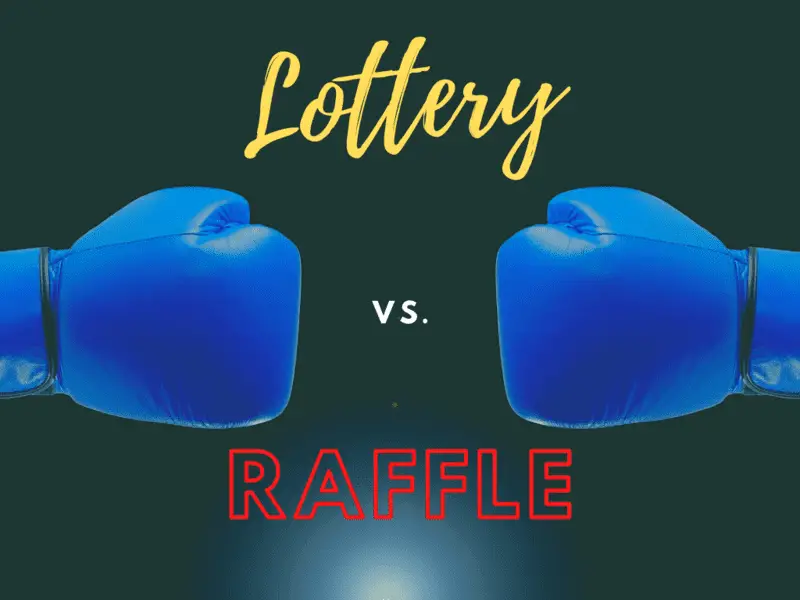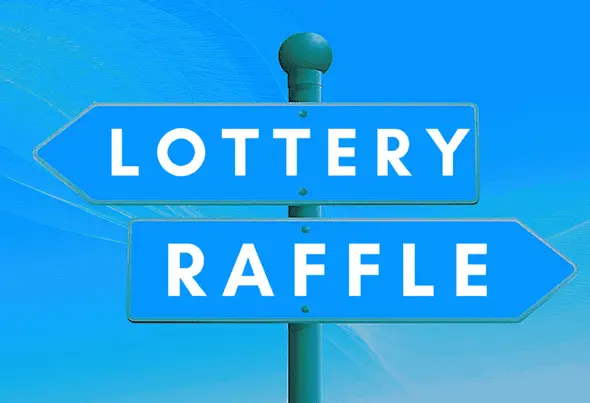Lottery vs. Raffle: What's the Difference?
Part of the fun of playing the lottery or participating in a raffle is the fact that there are no special skills involved. Everyone has the same chance of winning, making them games of chance and not of ability or skill. However, there are distinctions between lotteries and raffles.
The main difference between a lottery and a raffle is that a lottery drawing can return a non-winning ticket while raffles always have winners. Another difference is that lottery players can choose their numbers, but raffle players can’t since raffle tickets have pre-printed numbers on them.
The rest of this article digs a little deeper into the exact nature of the differences between lotteries and raffles and what this means under current state laws.
What Is the Difference Between a Lottery and a Raffle?
Lotteries and raffles are forms of gambling in which players purchase tickets that have a chance of winning a prize. The chances of winning a lottery or raffle are determined randomly. However, there are both similarities and stark differences between these two games of chance.
The word “lottery” is a broad term that can include other games of chance like raffles and sweepstakes. A lottery, as defined by law, consists of three main elements:
- The game offers prizes that have monetary value;
- The ability to win the game is random;
- There must be an element of consideration (or an exchange of money or something of value).
As a general rule, lotteries are for-profit operations meeting all three elements. However, some raffles and most sweepstakes avoid technical classification as lotteries by eliminating the requirement to “pay to play,” be it by purchasing a ticket or a product or service.
In addition to this distinction, raffles and lotteries are different in three ways, which we will discuss below.
The Method of Play Differs Between Lotteries and Raffles
One of the main distinctions between lotteries and raffles is that lottery players have the option of picking the numbers they play, whereas raffles don’t offer that option as the tickets are pre-numbered.
How to Play a Lottery
The two main lotteries in the United States are MegaMillions and Powerball. In both lotteries, players select five random numbers (from 1 to 70 for Mega Millions and 1 to 69 for Powerball). Players also choose an additional number (from 1 to 25 for Mega Millions and 1 to 26 for Powerball).
Additionally, both Mega Millions and Powerball offer players the option of using their computer system to generate the numbers for each ticket purchased randomly.
Winners are randomly selected during nationally televised live drawings. Mega Millions broadcasts its drawings every Tuesday and Friday at WSB-TV Studios in Atlanta, Georgia, at 11 p.m. Eastern. And, Powerball airs its drawings every Wednesday and Saturday from the Florida Lottery studio in Tallahassee at 10:59 p.m. Eastern.
Both lotteries are two drum games with a drum with white balls representing the first five numbers and a second drum with golden Mega Millions balls and red Powerballs. To win, players must match the first five numbers, in no particular order.
For example, if a player chooses 2, 4, 8, 12, 16, and the Mega Ball or Powerball 10 and the winning numbers drawn are 12, 4, 16, 2, 6 (10), that player wins the jackpot.
However, players must select an exact match with the golden Mega Ball or the red Powerball. Using the winning numbers above, if the Mega Ball or Powerball drawn ends up being 12, that player does not win the jackpot.
How to Play a Raffle
Similar to the lottery, a raffle is a game of chance in which players obtain numbered tickets.
Raffles typically offer multiple prizes with a different ticket assigned to each award. Additionally, some raffles include cash prizes. The prize drawings are usually held at special events or fundraisers.
During the prize drawing tickets are drawn by an official until all the prize-winning tickets have been pulled.
Raffles are popular with nonprofit schools and organizations as they typically draw more attention than traditional fundraisers since donors have a chance of winning a prize, or prizes.
Raffles Always Have Winners, Lotteries Don’t
Raffles always have a winner as opposed to lotteries. Winners are a near certainty in raffles since the drum or container only holds numbers corresponding to tickets sold to players.
Additionally, groups and organizations schedule raffles on specific dates, typically at events, and the raffle ends once winners are announced.
Inversely, the drums used for lottery drawings hold all the possible numbers, and there is a good chance that no one picked the winning combination. Additionally, that fact is exacerbated by the inclusion of the Megaball and Powerball, which requires an exact match for the final ball drawn from the drum.
For example, the overall chance of winning a Powerball drawing is 1 in 24.9, and the odds of winning the jackpot are 1 in 292 million. If nobody hits the winning combination at the drawing, the jackpot is rolled over into the next drawing.
However, this does have the effect of creating massive jackpots in some lotteries. For example, in March 2012, Mega Millions set a world record with a $645 million jackpot. Similarly, Powerball made history in January 2016 with a prize of nearly $1.6 billion.
State Laws Distinguish Raffles From Lotteries
Although laws vary by state, there are clear distinctions between the two from coast to coast. For example, 45 states host the Mega Millions and Powerball lotteries along with Washington D.C., the United States Virgin Islands, and Puerto Rico. The five states prohibiting lotteries include Nevada, Utah, Alabama, and Alaska.
By comparison, raffles are only legal in 47 of the 50 states. The states prohibiting them include Utah, Hawaii, and Alabama. However, the laws governing raffles usually limit them to charities, churches, and civic organizations. Additionally, they have strict guidelines regulating the use of any profits.
For example, in California, “charities and certain other private nonprofit organizations” are the only groups allowed to conduct raffles and only “to raise funds for beneficial or charitable purposes in the state.” Additionally, California requires that “at least 90 percent of the gross receipts” from raffles must remain in the state.
Similarly, Texas allows charitable raffles by qualified religious societies, fire departments, volunteer emergency medical services, or nonprofit organizations “under the terms and conditions imposed by general law.” Additionally, all proceeds from raffle tickets sales “must be spent for the charitable purposes of the organizations,” and the raffles are only administered, conducted, and promoted “exclusively” by members of those organizations.
Texas law also allows charitable foundations run by professional sports teams and organizations to conduct charitable raffles. However, unlike other charities, these foundations can pay “reasonable” administrative expenses using receipts from the sale of raffle tickets.
Chance2Win.org, an online raffle service, posted an alphabetical summary of laws for all 50 states on their website. You can access that page by clicking here.
Federal Income Tax Regulations
The Internal Revenue Service has withholding and filing requirements for lotteries and raffles under certain circumstances.
Withholding requirements kick in if total earnings exceed $5,000. Likewise, hosting groups must report prize winners if:
- Prize value exceeds $600, and
- The prize value is 300 times bigger than the purchase price of one ticket (minus the cost of the ticket).
As an example, Mark buys a raffle ticket for $10, and the prize is worth $1,000.
- The prize value exceeds $600 ;
- 300 times his wager of $10 equals $3,000, minus the price of one ticket or $2,990.
In this instance, there is no reporting requirement since the value of the prize is less than $2,990. However, if the ticket price were $1, that would make the prize value $299, which kicks in the reporting requirement.
The Wrap Up
We hope you enjoyed our article discussing lotteries versus raffles. Although there are similarities between both games of chance, their differences remain stark.
Be sure to check the current statutes in your state before hosting a raffle as the states highly regulate them. Additionally, familiarize yourself with reporting requisites with the IRS to avoid any problems with federal laws.
You might consider bookmarking this article if you plan on playing the lottery or hosting a raffle.
Until we meet again, we wish you the best of luck!







